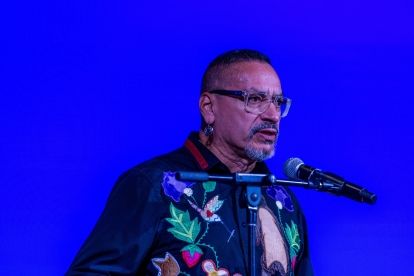
Share
The first day of Unifor’s Canadian Council was a tour de force.
A thousand Unifor local leaders and activists packed Montreal’s Palais des congrès on Sept. 27 ready to celebrate the last year of the union’s victories, share stories of activism, and renew a shared commitment to move forward with solidarity during the three-day council.
“My god, this room. The energy. The vibe. What a force,” said Unifor National President Lana Payne in her address. “And I am so proud of every single one of you. What a year you have all had. What a year we have had.”
The council opened with a moving address by Mi'kmaq First Nations member Don Barnaby, a Red Road Warrior and traditional dancer, who shared the tragic story of his mother’s life growing up in a residential school and their generational trauma and his healing from that inheritance.
“My mother, it wasn’t her fault what she did to me and my siblings, but all I could do is pray for her,” he said. “I sing for those who can’t sing. I dance for those who can’t dance…Pow Wow saved my life.”
In her National President’s report, Payne shared that Unifor and workers across Canada are having a moment to fight for stronger contracts and for their rights.
She emphasized the momentum by the Metro strike last summer that impacted 3,700 workers in the Greater Toronto Area and the subsequent pattern bargaining that followed changed everything.
“It changed lives. It changed our union. It inspired an entire labour movement,” she said.
“And by the time the strike was settled, the courage of these workers had propelled Unifor into a new place. What this union did in the retail sector in the past year showed every employer we deal with that this union fights for everyone. And when we fight, we win.”
She called the members’ efforts to shape the union as “militant, bold and kick-ass.”
A few weeks ago, more than 800 workers in a Walmart distribution centre warehouse voted in favour of joining Unifor, despite an aggressive anti-union campaign. This week, that unit was certified by the Ontario Labour Relations Board and on the same day, Wal-Mart handed out $94 million in pay raises to their Canadian employees.
“We haven’t even sat down to a bargaining table yet and this employer is ponying up. So, get ready folks, because this is going to be epic,” said Payne.
She said workers from every sector of the economy – from aviation, health care, auto parts, manufacturing, hospitality and energy, among others – are joining the union.
In the last year, workers’ demands for respect have won historical contracts, wage increases, pension improvements, COLA, women’s and racial justice advocates, and mental health language and supports.
“We did this together,” said Payne. “I promised that we would be there, leading our members, flexing our union muscle and using our power.”
The national president is bringing four recommendations forward that cover the right to strike, building Canada’s industrial economy, committing to politics for workers, and affirming Truth and Reconciliation in Canada.
The council gave support for striking workers.
Members of Local 171 working for Stablex in Blainville, Que. went on strike on Monday of this week. The 134 members are demanding a decent wage increase in response to the employer presenting the lowest monetary increase in 16 years.
“The employer came with about 100 demands, we were surprised,” said Local 171 President Jonathan Trudel. “They wanted to test us. They made us another offer that was worse than the first one. They tried to undermine us.”
Delegates showed some love for Unifor members at Local 1541 who have been on the picket line since May 1 at Best Theratronics, a medical equipment manufacturing facility in Kanata, Ont. after the employer gave a 0% wage increase offer over two years.
“The work we do is amazing and so important for people battling cancer all around the world. But we’re about 20% below the rate of inflation,” said Local 1541 bargaining committee member James Thuot.
Quebec Regional Director Daniel Cloutier showed immense pride that the union’s council was taking place in Montreal. He took a few moments to honour Quebec National Representative Joël Perreault who died by suicide last fall.
“I’m talking about this today, because we really still miss him and it’s an opportunity again to talk about mental health,” said Cloutier. “Ask for help. Don’t isolate yourself. Don’t hesitate. Don’t remain isolated.”
Cloutier highlighted the strike victories in Quebec over the last year, including Viterra, Canadoil Forge, Kruger and St. Lawrence Seaway. He also proudly recalled Quebec’s mobilization for Autoport members and fighting for telco and media members during the #ShameonBell campaign.
Cloutier emphasized political action is needed to help ease the forestry crisis.
“We have to see forestry as one of the big economic booms for Quebec and Ontario,” and our union has to help preserve forests for generations to come, he noted.
“I could tell you about the actions of our Quebec members for hours, and even then, it would not be enough to describe the amount of heart that they put into it every day,” Cloutier said.
“The aerospace sector is a vital pillar of Quebec's economy and a symbol of our technological expertise. We are committed to defending the rights of the workers who contribute to this world-class industry, ensuring they benefit from fair working conditions and strong future prospects.”
Magali Picard, president of Fédération des Travailleurs et Travailleuses du Québec (FTQ), warned that a Conservative Pierre Poilievre government could create a massive destabilization for workers if he eliminates the Rand formula – a Supreme Court decision that allows unions to collect dues from paycheques.
In 2012, Poilievre ran a campaign that took aim to allow public sector workers to opt out of paying union dues.
“He talks to people, and he doesn’t tell them the truth. He wants to get rid of unions,” said Picard.
“If we lose the Rand formula, [Canada] will be the same as our neighbours to the south.”
Picard referred to Detroit being the fourth wealthiest U.S. state in 2010, but which lost the Rand formula in 2012. As a result, about 50% of workers stopped paying union dues. Six months later, less than 5% paid their dues, causing unions to go bankrupt and collective agreements to go into the garbage. By 2016, Detroit went bankrupt, she said, and she doesn’t want the same to happen to Canadian cities.
“We have to show him that workers won’t let them trample their rights,” she said. “It’s no fun talking politics, but our future lies in our hands.”








